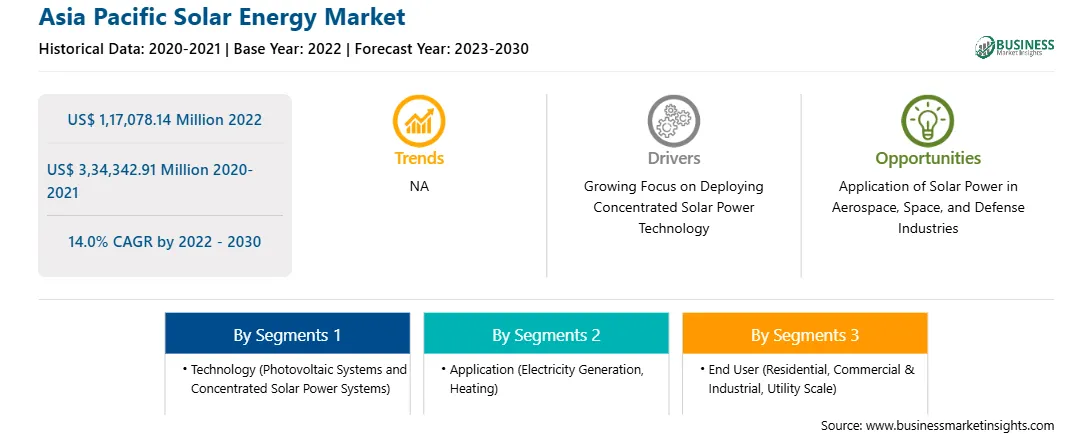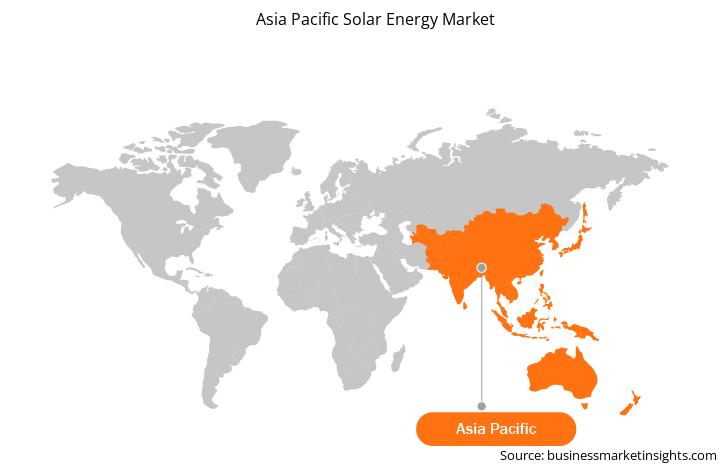The growing technological development and government initiatives are boosting the application of solar energy in various end-use sectors such as aerospace and defense. One of the key applications of solar power in the aerospace and defense industries is solar-powered UAVs. Solar-driven UAVs are unarmed platforms that depend solely on energy powered by the SUN to properly perform their functions. Solar UAVs are utilized in roles such as communications and persistent ISR. Solar-powered UAVs help secure communication in remote areas among defense forces, improving broadband connection. In addition, spacecraft have solar panels that transform the Sun's energy into electricity that provides power to the spacecraft. Also, solar energy has been utilized to power spacecraft on Mars, including NASA's Mars Exploration Rovers—Spirit and Opportunity and Mars’ Phoenix lander. Thus, the rising application of solar power in the aerospace, space, and defense industries is likely to create lucrative opportunities for the solar energy market players to boost the adoption of solar energy-based systems in the coming years.
Growing focus on curbing environmental pollution by reducing greenhouse gas emissions and rising government initiatives toward increasing the stake of renewable energy resources in the overall power mix are major reasons for solar energy market growth in Asia Pacific. China, Australia, India, and Japan are a few key countries contributing to Asia Pacific's solar energy market growth. Growing focus on concentrated solar power plants and increasing demand for energy security are important drivers for the solar energy market in Asia Pacific. Net zero carbon emission targets of major countries and reducing carbon footprint in the industrial sector are also boosting the solar energy market in Asia Pacific. The growing government initiatives regarding rebates and tax credits influence the solar energy market growth. The rebates for solar panels and rooftop solar systems are increasing the application of solar systems in residential and commercial sectors.
Some of the policies related to renewable energy:
• The Australian government has pledged to expand the share of renewable power generation in Australia’s main National Electricity Market to 82% by 2030. The Australian government also targets lowering carbon emissions by 43% by 2030 and becoming a carbon-neutral nation by 2050.
• The National Development and Reform Commission is accountable for framing and implementing strategies concerning economic and social development in the country. The power governing structure is managed by the National Energy Administration, which works with the NDRC. China aimed for non-fossil fuels to hold for 20% of the energy generation mix by 2025.
• Indian Renewable Energy Development Agency offers low-interest loans for developing eligible renewable energy projects in the country. India has targeted achieving 50% cumulative electric power installed by 2030 from renewables and net-zero carbon emissions by 2070. Moreover, in 2022, the government introduced a ‘Mission 500GW’ action plan to attain the overall renewable target.
• Japanese Ministry for Economy, Trade, and Industry’s energy department declared a subsidy system for renewable energy. The FiTs will be swapped by Feed-in Premium’s through an auction mechanism for some categories commencing from April 2022. Japan targets to achieve approximately 36-38% renewable power in its generation mix by 2030 and net carbon neutrality by 2050.
• The South Korean power market underwent reform in 2001, and the Korean Electricity Commission (KOREC) was formed under the Ministry of Knowledge Economy (MKE). The South Korean government is firmly committed to accelerating the country’s energy evolution and has targeted to grow the share of renewable power production to 20% by 2030 and approximately 30-35% by 2040.
The Asia Pacific solar energy market is segmented into technology, application, end user, and country.
Based on technology, the Asia Pacific solar energy market is segmented into photovoltaic systems and concentrated solar power systems. The photovoltaic systems held a larger share of the Asia Pacific solar energy market in 2022. The photovoltaic systems is further sub segmented into monocrystalline, polycrystalline, and others. The concentrated solar power systems is further sub segmented into linear concentrator, dish/engine, and power tower systems.
Based on application, the Asia Pacific solar energy market is segmented into electricity generation, heating, and others. The electricity generation segment held the largest share of the Asia Pacific solar energy market in 2022.
Based on end user, the Asia Pacific solar energy market is segmented into residential, commercial & industrial, and utility scale. The utility scale segment held the largest share of the Asia Pacific solar energy market in 2022.
Based on country, the Asia Pacific solar energy market is segmented into Australia, China, India, Japan, South Korea, and the Rest of Asia Pacific. China dominated the Asia Pacific solar energy market in 2022.
Abengoa SA, Acciona SA, Canadian Solar Inc, First Solar Inc, JinkoSolar Holding Co Ltd, and Trina Solar Co Ltd are some of the leading companies operating in the Asia Pacific solar energy market.
Strategic insights for the Asia Pacific Solar Energy provides data-driven analysis of the industry landscape, including current trends, key players, and regional nuances. These insights offer actionable recommendations, enabling readers to differentiate themselves from competitors by identifying untapped segments or developing unique value propositions. Leveraging data analytics, these insights help industry players anticipate the market shifts, whether investors, manufacturers, or other stakeholders. A future-oriented perspective is essential, helping stakeholders anticipate market shifts and position themselves for long-term success in this dynamic region. Ultimately, effective strategic insights empower readers to make informed decisions that drive profitability and achieve their business objectives within the market.

| Report Attribute | Details |
|---|---|
| Market size in 2022 | US$ 1,17,078.14 Million |
| Market Size by 2030 | US$ 3,34,342.91 Million |
| Global CAGR (2022 - 2030) | 14.0% |
| Historical Data | 2020-2021 |
| Forecast period | 2023-2030 |
| Segments Covered |
By Technology
|
| Regions and Countries Covered | Asia-Pacific
|
| Market leaders and key company profiles |
The geographic scope of the Asia Pacific Solar Energy refers to the specific areas in which a business operates and competes. Understanding local distinctions, such as diverse consumer preferences (e.g., demand for specific plug types or battery backup durations), varying economic conditions, and regulatory environments, is crucial for tailoring strategies to specific markets. Businesses can expand their reach by identifying underserved areas or adapting their offerings to meet local demands. A clear market focus allows for more effective resource allocation, targeted marketing campaigns, and better positioning against local competitors, ultimately driving growth in those targeted areas.

The Asia Pacific Solar Energy Market is valued at US$ 1,17,078.14 Million in 2022, it is projected to reach US$ 3,34,342.91 Million by 2030.
As per our report Asia Pacific Solar Energy Market, the market size is valued at US$ 1,17,078.14 Million in 2022, projecting it to reach US$ 3,34,342.91 Million by 2030. This translates to a CAGR of approximately 14.0% during the forecast period.
The Asia Pacific Solar Energy Market report typically cover these key segments-
The historic period, base year, and forecast period can vary slightly depending on the specific market research report. However, for the Asia Pacific Solar Energy Market report:
The Asia Pacific Solar Energy Market is populated by several key players, each contributing to its growth and innovation. Some of the major players include:
The Asia Pacific Solar Energy Market report is valuable for diverse stakeholders, including:
Essentially, anyone involved in or considering involvement in the Asia Pacific Solar Energy Market value chain can benefit from the information contained in a comprehensive market report.